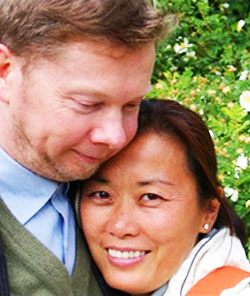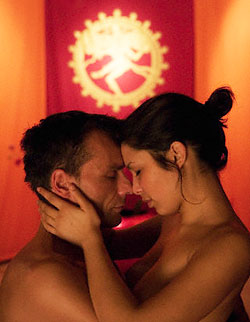Relationships – True Love and the Transcendence of Duality
Interview By Kim Eng
 Kim Eng travels and works extensively with Eckhart Tolle, the author of the best-selling books The Power of Now and A New Earth, taking his teachings around the world. She is Eckhart’s partner and associate.
Kim Eng travels and works extensively with Eckhart Tolle, the author of the best-selling books The Power of Now and A New Earth, taking his teachings around the world. She is Eckhart’s partner and associate.
Born in Vancouver, Canada, Kim’s spiritual search began in the early 1980s. She met Eckhart in 1998, and soon after went through a transformational spiritual experience while attending one of his retreats. After seven years of intense spiritual training, she began counseling and showing others how to discover their own inner teacher and healer.
As a counselor and public speaker, as well as a facilitator of “Presence through Movement” workshops, Kim has developed her own teaching modality, which is aimed at the transformation of consciousness through the integration of spirit, mind and body.
During my travels, one of the most frequently asked question is “What is it like to be in relationship with an enlightened being?” Why this question? Perhaps they have the idea or image of an ideal relationship, and want to know more about it. Perhaps their mind wants to project itself to a future time when they, too, will be in an ideal relationship and find themselves through it.
What is it like to be in relationship with an enlightened being?
As long as I have the idea in my head “I have a relationship” or “I am in a relationship,” no matter with whom, I suffer. This I have learnt.
With the concept of “relationship” come expectations, memories of past relationships, and further personally and culturally conditioned mental concepts of what a “relationship” should be like. Then I would try to make reality conform to these concepts. And it never does. And again I suffer. The fact of the matter is: there are no relationships. There is only the present moment, and in the moment there is only relating.
How we relate, or rather how well we love, depends on how empty we are of ideas, concepts, expectations.
Recently, I asked Eckhart to say a few words on the ego’s search for “love relationships.” Our conversation quickly went deeper to touch upon some of the most profound aspects of human existence. Here’s what he said:
 Eckhart Tolle: What is conventionally called “love” is an ego strategy to avoid surrender. You are looking to someone to give you that which can only come to you in the state of surrender. The ego uses that person as a substitute to avoid having to surrender. The Spanish language is the most honest in this respect. It uses the same verb, te quiero, for “I love you” and “I want you.” To the ego, loving and wanting are the same, whereas true love has no wanting in it, no desire to possess or for your partner to change. The ego singles someone out and makes them special. It uses that person to cover up the constant underlying feeling of discontent, of “not enough,” of anger and hate, which are closely related. These are facets of an underlying deep seated feeling in human beings that is inseparable from the egoic state.
Eckhart Tolle: What is conventionally called “love” is an ego strategy to avoid surrender. You are looking to someone to give you that which can only come to you in the state of surrender. The ego uses that person as a substitute to avoid having to surrender. The Spanish language is the most honest in this respect. It uses the same verb, te quiero, for “I love you” and “I want you.” To the ego, loving and wanting are the same, whereas true love has no wanting in it, no desire to possess or for your partner to change. The ego singles someone out and makes them special. It uses that person to cover up the constant underlying feeling of discontent, of “not enough,” of anger and hate, which are closely related. These are facets of an underlying deep seated feeling in human beings that is inseparable from the egoic state.
When the ego singles something out and says “I love” this or that, it’s an unconscious attempt to cover up or remove the deep-seated feelings that always accompany the ego: the discontent, the unhappiness, the sense of insufficiency that is so familiar. For a little while, the illusion actually works. Then inevitably, at some point, the person you singled out, or made special in your eyes, fails to function as a cover up for your pain, hate, discontent or unhappiness which all have their origin in that sense of insufficiency and incompleteness. Then, out comes the feeling that was covered up, and it gets projected onto the person that had been singled out and made special – who you thought would ultimately “save you.” Suddenly love turns to hate. The ego doesn’t realize that the hatred is a projection of the universal pain that you feel inside. The ego believes that this person is causing the pain. It doesn’t realize that the pain is the universal feeling of not being connected with the deeper level of your being – not being at one with yourself.
The object of love is interchangeable, as interchangeable as the object of egoic wanting. Some people go through many relationships. They fall in love and out of love many times. They love a person for a while until it doesn’t work anymore, because no person can permanently cover up that pain.
Only surrender can give you what you were looking for in the object of your love. The ego says surrender is not necessary because I love this person. It’s an unconscious process of course. The moment you accept completely what is, something inside you emerges that had been covered up by egotic wanting. It is an innate, indwelling peace, stillness, aliveness. It is the unconditioned, who you are in your essence. It is what you had been looking for in the love object. It is yourself. When that happens, a completely different kind of love is present which is not subject to love / hate. It doesn’t single out one thing or person as special. It’s absurd to even use the same word for it. Now it can happen that even in a normal love / hate relationship, occasionally, you enter the state of surrender. Temporarily, briefly, it happens: you experience a deeper universal love and a complete acceptance that can sometimes shine through, even in an otherwise egoic relationship. If surrender is not sustained, however, it gets covered up again with the old egoic patterns. So, I’m not saying that the deeper, true love cannot be present occasionally, even in a normal love / hate relationship. But it is rare and usually short-lived.
 Whenever you accept what is, something deeper emerges then what is. So, you can be trapped in the most painful dilemma, external or internal, the most painful feelings or situation, and the moment you accept what is, you go beyond it, you transcend it. Even if you feel hatred, the moment you accept that this is what you feel, you transcend it. It may still be there, but suddenly you are at a deeper place where it doesn’t matter that much anymore.
Whenever you accept what is, something deeper emerges then what is. So, you can be trapped in the most painful dilemma, external or internal, the most painful feelings or situation, and the moment you accept what is, you go beyond it, you transcend it. Even if you feel hatred, the moment you accept that this is what you feel, you transcend it. It may still be there, but suddenly you are at a deeper place where it doesn’t matter that much anymore.
The entire phenomenal universe exists because of the tension between the opposites. Hot and cold, growth and decay, gain and loss, success and failure, the polarities that are part of existence, and of course part of every relationship.
Kim Eng: Then it’s correct to say, we can never get rid of the polarities?
Eckhart Tolle: We cannot get rid of polarities on the level of form. However, you can transcend the polarities through surrender. You are then in touch with a deeper place within yourself where, as it were, the polarities no longer exist. They continue to exist on the outer level. However, even there, something changes in the way in which the polarities manifest in your life when you are in a state of acceptance or surrender. The polarities manifest in a more benign and gentle way.
The more unconscious you are, the more you are identified with form. The essence of unconsciousness is this: identification with form, whether it is an external form (a situation, place, event or experience), a thought form or an emotion. The more attached to form, the more unsurrendered you are, and the more extreme, violent or harsh your experience of the polarities becomes. There are people on this planet who live virtually in hell and on the same planet there are others who live a relatively peaceful life. The ones who are at peace inside will still experience the polarities, but in a much more benign way, not the extreme way in which many humans still experience them. So, the way in which the polarities are experienced does change. The polarities themselves cannot be removed, but one could say, the whole universe becomes somewhat more benevolent. It’s no longer so threatening. The world is no longer perceived as hostile, which is how the ego perceives it.
Kim Eng: If awakening or living a life in an awakened state does not change the natural order of things, duality, the tension between the opposites, what does living a life in the awakened state do? Does it affect the world, or only one’s subjective experience of the world?
Eckhart Tolle: When you live in surrender, something comes through you into the world of duality that is not of this world.
 Kim Eng: Does that actually change the outer world?
Kim Eng: Does that actually change the outer world?
Eckhart Tolle: Internal and external are ultimately one. When you no longer perceive the world as hostile, there is no more fear, and when there is no more fear, you think, speak and act differently. Love and compassion arise, and they affect the world. Even if you find yourself in a conflict situation, there is an outflow of peace into the polarities. So then, something does change. There are some teachers or teachings that say, nothing changes. That is not the case. Something very important does change. That which is beyond form shines through the form, the eternal shines through the form into this world of form.
Kim Eng: Is it right to say that it is your lack of “reaction against,” your acceptance of the opposites of this world, that brings about changes in the way the opposites manifest?
Eckhart Tolle: Yes. The opposites continue to happen, but they are not fueled by you anymore. What you said is a very important point: the “lack of reaction” means that the polarities are not fueled. This means, you often experience a collapse of the polarities, such as in conflict situations. No person, no situation is made into an “enemy.”
Kim Eng: So, the opposites, instead of becoming strengthened, become weakened. And perhaps this is how they begin to dissolve.
Eckhart Tolle: That’s right. Living in that way is the beginning of the end of the world.
yogaesotericJuly 2010


